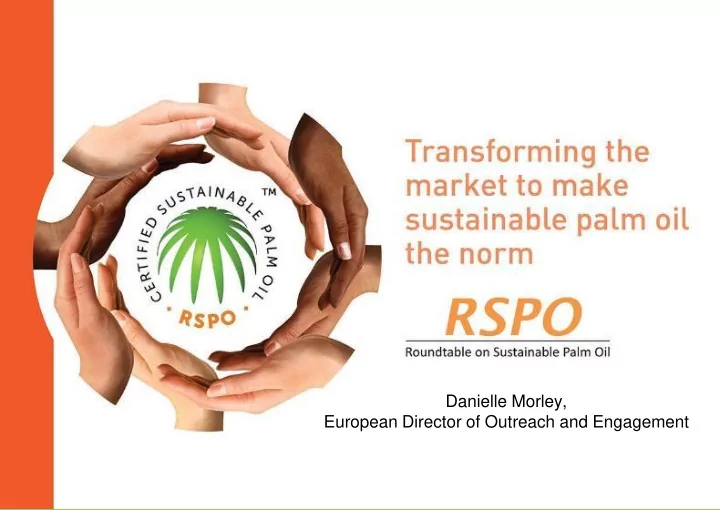

Danielle Morley, European Director of Outreach and Engagement
Palm Oil has been responsible for an economic miracle. 4.5 Million people in Malaysia and Indonesia earn their living from palm oil production Increasing palm oil demand has led to loss of tropical forest. Deforestation & degradation 21. contributes 11% of annual global carbon emissions * *UNDP, UNEP, WRI, World Bank – interim report 2013-14
Conversion of tropical forests leads to loss of biodiversity, ecosystem services and habitats for orang-utans, tigers and other endangered animals The health and safety of workers and their families 21. Impacts on local communities, particularly disputes over land rights.
W HY S USTAINABILITY ? • Thanks to EU food labelling laws , consumers are now more aware of the presence of palm oil in their food products • NGO activism has further raised awareness about the deforestation linked to conventional palm oil • Financial institutions such as the Norwegian Sovereign Wealth Fund have divested from companies linked with deforestation
W HY S USTAINABILITY ? Consumers are demanding that their products are produced ethically, failure to do so can cost businesses money – Companies from fast food brands to personal care products have come under fire to ditch conventional palm oil
W HY S USTAINABILITY ? • Economic development • Social impacts • Consumers • Increased yield • Sustainable profits • Securing a supply chain • Halting deforestation • Protecting 21. Biodiversity Triple bottom line • Conserving watersheds
Mission and Vision Vision Mission Develop credible global standards for sustainable palm oil RSPO will transform Create a system of assurance the markets to make for the entire supply chain sustainable palm oil Engage and commit all the norm. stakeholders in the supply chain Monitor & evaluate the impact of certification and market uptake
Certification • Palm oil mills are certified according to RSPO’s P&C • For a mill to be certified it must show that all its supply (from owned or independent sources) has been certified • To be certified, a mill must also show a plan to have all of its smallholders certified within 3 years Cost of Certification • Oil mills and their supply base hire an Costs of certification vary and are agreed RSPO-approved certification body to between the member and the certification body set up audits testing their compliance Smallholders can have their costs reimbursed with the RSPO Principles & Criteria through the Smallholder Support Fund (RSSF), in 2014 the budget for this fund was USD $1.4MM
Supply Chain Models Identity Preserved (IP) • Sustainable palm oil kept apart and is traceable to the mill and its supply base. Segregated (SG) • Mixing of sustainable palm oil batches is allowed Mass Balance (MB) • Mixing of sustainable and conventional palm oil is allowed if it is monitored administratively Book & Claim (B&C) • GreenPalm certificates sold by mills directly to end-users
A global trademark Trademark that signals the use of RSPO-certified sustainable palm oil:
RSPO continuously improving • 100% in Europe by 2020 Regional Targets • 50% in Indonesia and Malaysia, 30% in India and 10% in China. How is RSPO • RSPO+ Credibility and facilitating • Licensed HCV assessors Sustainability • Traceability change? • Strengthening Complaints Transparency and • Concession maps & satellites Accountability • ACOP suspensions
RSPO+ • Voluntary addendum to RSPO P&C • Enhanced standards on: • Deforestation • Peat-land Development • Labour rights, land rights, • Indigenous People’s Rights
100% Certified Sustainable Palm Oil in Europe by 2020 Europe has the ability to achieve 100% CSPO & create new supply chain model Home of many global manufacturers and retailers with CSPO commitments Increased public awareness, industry demand and accessibility of supplies 100% CSPO Europe will incentivize producers and influence other markets
Poland: Priority market Key data: RSPO members: 28 Total palm oil imported 266,100 t (2014) Outlook: • Rapidly raising consumer awareness due to new food labelling rules; • The sector with the greatest interest in sustainable palm oil is the oleochemical sector, although the food sector is the largest user of palm oil • A dedicated conference on palm oil was held in Poland in November 2014 to further sensibiliser the market to the issues of palm and palm kernel oil, with the support of the United Nations Global Compact • Sustainability issues are the main concern noted with palm oil and palm kernel oil • Limited awareness of RSPO and CSPO among supply chain members and media.
Supporting development of Polish market for CSPO Stakeholder analysis Market analysis Information and helpdesk for technical questions Support local members to overcome technical and logistical barriers Events for supply chain businesses to promote collaboration Communications and media outreach to key influencers Learning from others.
Annual RSPO European Roundtable - June
Palm Oil Debate
Recommend
More recommend